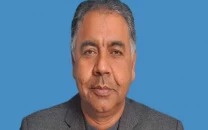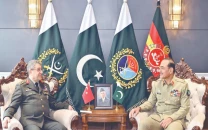In search of a starting point

Of course, no one is denying the fact that both countries have squandered billions of rupees over the decades in fighting wars with each other and in building up their armies and nuclear arsenals. That they have done this while having the world’s largest poor population and among the highest rates of infant and child mortality and illiteracy is downright criminal. But the point is that progress on any issue can come only if the two sides at least are agreed on what the starting point is to be. Mr Qureshi’s rather blunt press conference has brought out the inevitable hawks on the other side of the border, notably the BJP whose Yashwant Sinha (a former foreign minister) has already said that Mr Krishna should have immediately held a counter-press conference in Islamabad to deny Mr Qureshi’s assertions. Sections of the Indian media have also castigated the Indian foreign minister for not denying his Pakistani counterpart’s statement – during the joint press conference on July 15 – where he said that no Pakistani intelligence agency was involved in carrying out attacks on Indian soil.
To see things in context, perhaps one needs to step back and see the larger picture. The Pakistani side is clearly upset because so far it was understood – and this is something that Mr Krishna’s boss, Prime Minister Manmohan Singh, has said on record several times – that India is ready to discuss with Pakistan all issues, including the conflict of Kashmir and other boundary-related disputes. India perhaps wants to convey to Pakistan that the ground rules have now changed and that Kashmir will not be on the agenda until and unless tangible action is seen on the LeT men charged with involvement in the Mumbai attacks. In particular New Delhi must be miffed at what it sees as Pakistan’s complete complacency (and perhaps tacit approval) in letting Hafiz Muhammad Saeed roam around freely in the country, and incite his followers for launching a jihad on Indian targets. Islamabad, however, will see this as confusion in the Indian ranks, and hence Mr Qureshi’s specific example in the press conference – which is unheard of – where he mentioned that in his meeting the Indian foreign minister was constantly taking instructions from New Delhi (something which the latter has now denied).
The Indians, understandably, want action on the LeT men and Pakistan needs to deliver on that score. It also perhaps needs to set a timeframe within which this is to be done. Furthermore, they want progress on trade and culture ties and this perhaps means a de-linking of Kashmir for the time being, something that the hawks on this side of the border will in all likelihood fiercely resist. The bottom line is that both sides need to figure out a starting point. India needs to understand that any further delays in the resumption of the composite dialogue – which includes discussions on all issues, not just those that India wants to talk on – will strengthen the hands of those who don’t want Pakistan and India to live in peace. Pakistan, for its part, needs to realise that it must satisfy India’s concerns on terror especially given the background of 26/11.
Published in The Express Tribune, July 17th, 2010.



















COMMENTS
Comments are moderated and generally will be posted if they are on-topic and not abusive.
For more information, please see our Comments FAQ